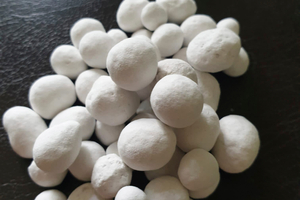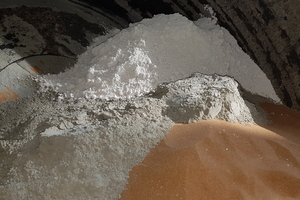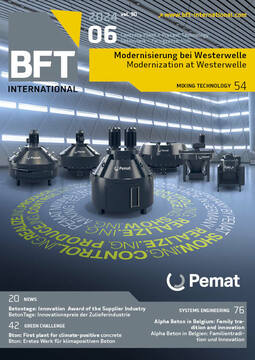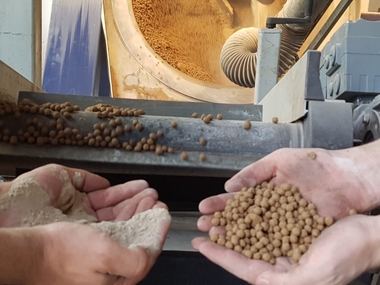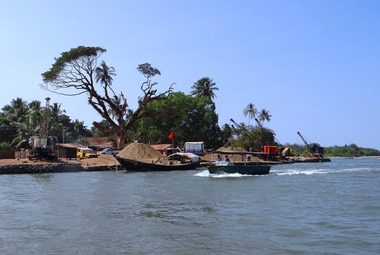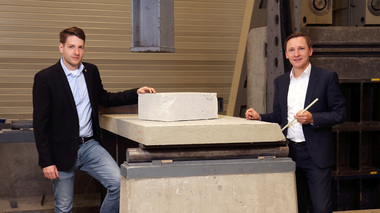Fine and recycled sands for the production of concrete
To produce sustainable concrete with fine sands that are not usable until now – this was the approach of Multicon for inventing a new method for processing and utilizing regional fine and crushed sands, recycled mineral materials up to the use of desert sand (in the MENA countries, among others) that are not suitable so far. Sand and gravel plants, the recycling industry but also the concrete industry should be concerned with these new patented technologies.
It is known that naturally occurring fine sands, elutriable fines contents, but also fine and crushed mineral materials arising as unwanted byproducts of the mechanical crushing process are very valuable ecologically. However, these materials occurring in sand and gravel plants but also at recycling companies can only be supplied to the value-added process to a limited extent. The reason here is the fact that these materials are too fine, with an unfavorable effect on the concrete quality. Moreover, fine sands of < 2 mm – according to current relevant standards – are allowed to be used as fillers at best, but not as recycled aggregates for the production of concrete. The same applies to the virtually infinite amounts of available desert sands which are ground too fine as well. Against the backdrop of prevailing sand scarcity all over the world, this situation is absolutely preposterous.
Until now, a suitable technology has not been available in order to supply these large quantities of occurring „fine sands“ of various kinds to a material application. Multicon has developed a method now, solving this problem and the idea had been applied for patent under No. DE 10 2017 006 720 „Baustoffgranulat, Verfahren zum Herstellen eines Baustoffgranulats auf der Basis von Mineralkörnern und seine Verwendung“ (Building material granules, process for the production of a building material granule based on mineral grains and its use) in 2017, which was granted in June 2018. With this patented method, the processing of mineral fine fractions of all kinds is possible by subjecting them to a granulation process, thus enabling the production of agglomerates in suitable sizes. These so-called pellets can then be returned to a value-enhancing concrete application.
This is achieved, as Multicon is grinding these so far unusable materials of <2 mm, but preferably also <0.063 mm, so to speak, destroying the particle structure in this way. In cooperation with the renowned Haver & Boecker company located in Oelde, based on the pelletizing technology, these ground powders are pelletized to granules in sizes suitable for the concrete industry of up to a maximum grain size of 16 mm. This means, for example, that regions being rich in sand but poor in gravel are now able to produce their own coarse aggregates from the available sands. All this saves logistics costs, associated CO2 emissions and not least money.
Resource conservation and environmental protection reinvented
The capacity of a disk pelletizer of Haver & Boecker with a diameter of 7.5 m amounts to a considerable output of approx. 100 tons of pellets per hour. The manufacturing costs of the pellets are absolute economic: the ROI is at about two to three years, depending on the local material prices.
By means of the dual suspension mixing technology of Multicon, being patented as well, these pellets are processed afterwards to valuable concrete of up to C30/37. In addition, this suspension mixing process, running in reverse mixing sequence, has excellent cement saving potentials, thus making a significant contribution to price and carbon reductions.
In summer 2023, the implementation of this technology has been tested by Multicon together with three renowned companies in the sand and recycling industries located in Switzerland, in South Germany and in the Netherlands with success. The tests with desert sand, but also with rock flour (limestone), had already been successfully concluded with a company located in Dubai about two years ago. It was determined, that almost all mineral raw materials that do not contain any substances that damage concrete can be processed. The purity of type, in particular for recycled materials, has to be ensured as well.
The following materials from the below-mentioned countries have been tested successfully in respect of granulation and concrete production so far:
from Switzerland: fine sand 0/1 mm, recycled sand 0/8 mm, gravel tailings in combination with fine sand 0/1 and recycled sand 0/8;
from South Germany: recycled sand 0/8 from concrete and recycled sand 0/8 from construction rubble;
from the Netherlands: fine sand 0/1;
from Dubai: desert sand 0/1;
others: limestone powder.
Obviously, the various material components can be processed among each other in a mix to get pellets, which then, of course, also in combination with natural aggregates, being used in the production of concrete.
With these technologies, Multicon makes a significant contribution to environmental protection as far as resource conservation, recirculation into the production cycle and carbon savings are concerned, but also contributing to cost reductions and to affordable construction additionally. Lower logistics costs, cement savings as well as projected taxes on sand and existing carbon taxes are only incurred to a limited extent.
These developments made by Multicon have already been registered by the media too. Apart from numerous publications in well-known print media, television networks such as „Servus TV“ and „3 SAT Nano“ have also addressed this technology and broadcast corresponding reports in the middle of 2023. The „First German Television“ of ARD has also dealt with the technology on January 04, 2024 within the show „Wer weiß denn sowas?“ (Who does know that?) in the section „Novelty“.
The dimension of this development is quite enormous, even because of the many possibilities of application and combination of most different raw materials. In order to introduce this technology all over Germany, Europe and the world extensively, Multicon is searching for strategic partners acting on a regional level, but also nationwide and/or internationally, who play a part in the implementation of this revolutionary and future-oriented technology. Various business models, but also success-oriented licensing models are possible here.
CONTACT
Multicon GmbH
Lucile-Grahn-Strasse 38
81675 München/Germany
+43 676 402-5577

